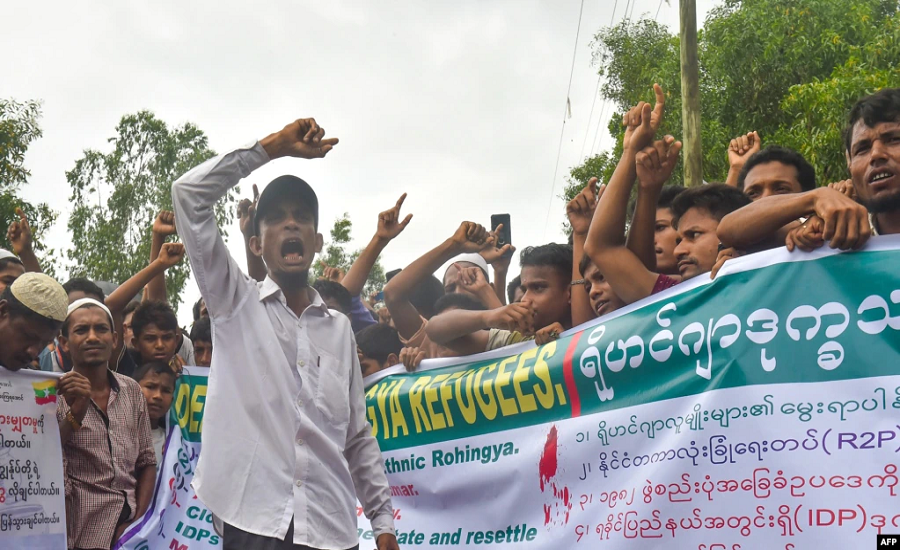Although many point out that the atmosphere in Myanmar is just as hostile to the Rohingya as when they escaped, if not more, the community feels a sense of urgency to return and reclaim their land.
Riya Singh Rathore & Sabber Kyaw Min
DHAKA — On 19th June, Dhaka saw Rohingya refugees launched a campaign, ‘Bari Cholo’ (Go Home). A banner held aloft by demonstrators read: “March to our native Arakan, our motherland. We are the citizens of Myanmar. Please world community help us save our rights in Myanmar. Let’s go home!! Let’s go to Myanmar!!!”
Similar protests mushroomed in over 23 areas across southeast Cox’s Bazar, with the Rohingya of different backgrounds converging at one place.
Rohingya are a highly persecuted ethnic Muslim minority from Myanmar’s Arakan region. They are primarily persecuted by Buddhist nationalists for practising Islam as their faith. Following large-scale violence in the form of killings, rapes, arson, harassment, economic boycott, and illegal arrests in 2017, many Rohingya fled to neighbouring countries including Bangladesh, Malaysia, and India to seek refuge. Bangladesh accommodated nearly one million Rohingyas of which 110,000 are children.
However, in the last five years, the conditions for the community have only worsened, both in Myanmar and in their host states.
For instance, Bangladesh’s Prime Minister Sheikh Hasina rhetorically questioned the length of time Bangladesh will bear the “burden” of a million displaced Rohingya. In the same meeting, she expressed sympathy for the displaced Ukrainians during the ongoing Russia-Ukraine conflict. This meeting took place on Sunday, the same day the refugees launched the ‘Go Home’ campaign.
It’s evident then that the campaign is not only the result of years of forced displacement but also the community’s frustration with the international community’s inaction. The living conditions of the refugees are inadequate at best and are becoming increasingly dangerous with frequent floods and fires ravaging their camps.
As a result of half a decade of neglect and surviving on bare minimum, the Rohingya feel disillusioned with the international diplomacy and justice system, especially with the International Criminal Court. This disenchantment has led the refugees to decide to rally for justice themselves. “Five years have passed. How long will we remain homeless?” One protestor at the ‘Go Home’ campaign demonstration asks. He began by thanking the United Nations and other humanitarian organisations for aid with food and shelter. However, in his address to the crowd, he declared, “But Bangladesh isn’t our country. We want to return to our homeland – Myanmar.” He critiques the inaction on the 2017 civil agreement signed between Bangladesh and Myanmar, with the support of China and the United States.
The crisis has come to a head. In Myanmar, the Rohingya are increasingly internally displaced. Meanwhile, in host countries, they are put in detention centres for years or deported. This was done with Hasina Begum, who India illegally deported after jailing her husband and three children for a year. Given this rising hostility in the host countries, increasing arrests, detentions, and deportation, dangerous living conditions in refugee camps, and a general lack of action against Myanmar’s state sponsored violence against the community, the refugees seem to be poised for a reverse exodus.
Following this, the refugees have tabled several demands during the ‘Go Home’ campaign before the world leaders. They began with a call for the ethnic Rohingya to regain citizenship, immediate repatriation of the Rohingya in their native villages, not refugee camps, abolition of the 1982 constitution, a ban on the torture of the general public in Myanmar, ensuring of the rights and safety of the Rohingya, and unrestricted movement of INGOs and international media in the country.
Currently, the international Rohingya community’s principal focus is restoration of their human rights followed by a safe and dignified return to their native villages, which they were forced to flee in 2017. Although many point out that the atmosphere in Myanmar is just as hostile to the Rohingya as when they escaped, if not more, the community feels a sense of urgency to return and reclaim their land.
On this International Refugee Day, the “Go Home” campaign casts a light on the cracks in the international refugee accommodation system and the lack of a long-term solution to any refugee crisis, especially ones that take place in the global south. While immediate help in the form of humanitarian aid is critical for sustaining the refugees, it’s equally important to have a long-term solution to the problems of the displaced in their native lands. A dignified return home must be the foremost priority while formulating any such solution.
_________________
Authors are activists for the Rohingya Human Rights Initiative


